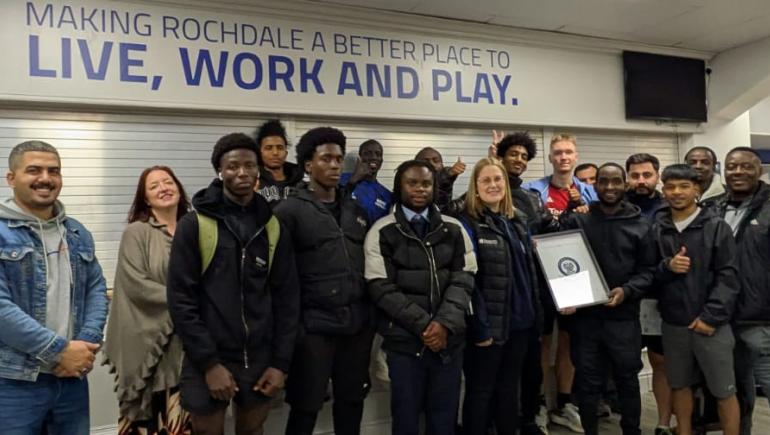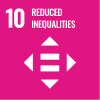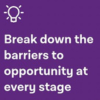In Greater Manchester, one grassroots football project is doing more than just getting people moving. For those navigating the UK’s asylum system, Rochdale AFC and Manchester City of Sanctuary's Hope Football programme is building community, confidence and a sense of belonging. ConnectSport’s Beth McCowen sat down with two of the key people behind the project to find out more. Liz Cotterill is the Coach and Manager for Rochdale AFC Hope Football, and Sarah McCarthy is the Volunteer Placement Co-Ordinator at Manchester City of Sanctuary.
Against a backdrop of increasing hostility towards migrants and a complex asylum process, the ‘Hope Football’ initiative offers something simple yet powerful - connection. Through this connection comes a foothold in a new life.
The work isn’t without its challenges, though. “People live on about £8.60 a week,” explains Sarah. “They need travel expenses, they need kit, and then it’s things like language barriers.”
COLLABORATION
For many people seeking sanctuary in the UK, even getting to a training session can be a financial and logistical struggle. Yet the programme continues to thrive on trust, collaboration and of course the power of football.
One of the most immediate successes of the programme is its accessibility. “Because of the physical nature and stuff, you’re using body language,” says Sarah. “Everyone can copy each other. If you’re doing warm-up exercises and things like that, (speaking different languages) is not as much of a problem.”
“The first thing that we find people need is community integration and how they can do that, and how they can achieve that is with support,” adds Liz.
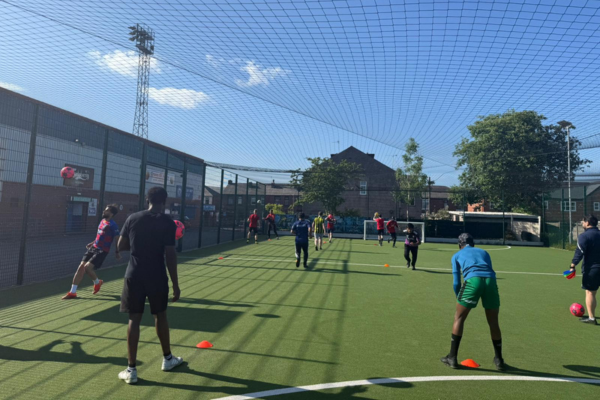
Sport is renowned for its ability to transcend language barriers, and Hope Football brings people from across the globe together and builds a unique way of communicating and cultivating important community relationships.
This initiative goes far beyond just recreational sport, however. Along with a chance to exercise - something which is vital for both physical and mental health - Hope Football offers opportunities for participants to grow as volunteers, coaches and community leaders.
“Volunteering became a massive side of the project itself, because that’s what enables people to live well, doing things every day,” declares Liz.
TRANSIENT
This pathway has already led to success, Liz explains. “We’re really proud that we’ve managed to get three people into the FA coaching pathway. One young person is currently working towards the UEFA ‘C’ licence. I’m really proud that we have coaches who have gone to work and volunteer for other clubs including Manchester City Academy.’’
Whilst such examples are encouraging, the transient nature of life for someone seeking asylum makes consistent progress difficult. “People might be living in one asylum hotel,” Sarah explains. “They start getting established in Manchester. And then one day they just get told ‘Oh, you’re moving to Liverpool’ which completely uproots people’s lives.”
Some participants aren't able to recall their address history, Liz reveals. “Some people don’t even know what address they were living in last year - let alone three or five years ago - when you’re fleeing from persecution.”
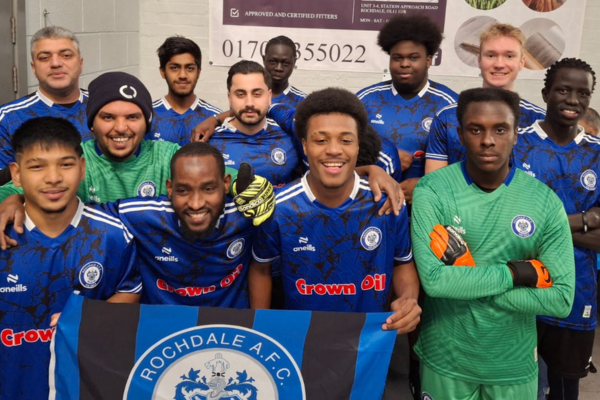
“This is really important when people are trying to gain a DBS check for volunteering or work. So to enable us to support them to do this, we work one to one and see what they can remember, thinking carefully not to open any trauma with this.
“For a volunteer DBS, we always take references too, and in football we can take a three-year history, which can be easier. We work very closely with the safeguarding lead at Rochdale AFC, who has been a massive support, and very patient in navigating through the DBS system with our volunteers and we are really thankful that we have this support.’’
Understanding cultural dynamics has been essential to the project’s success, particularly when it comes to gender and faith. Sarah notes: “Some people are really uncomfortable in participating because there’s men also playing in the sports hall nearby.”
RESPECT
Coaching roles can be complicated, but Liz is determined to use her role to make a difference. “For some cultures, it might be inappropriate for the men to look at, or make physical contact with a female coach,” Sarah continues. “But over time, Liz tells me that she’s built up an understanding of trust and respect. Now they just kind of see her as a coach and not as a female.”
Manchester City of Sanctuary's crucial work now includes running a study about getting sanctuary seekers involved in sports volunteering. Specifically, they are looking at barriers, good practice and organisational support needs. “One of the key things that I’ve identified in this study is that there is a need to broker that relationship,” Sarah explains. “To speak to the sanctuary-seeking community on the ground, and then building up the contacts with organisations.”
City of Sanctuary Manchester and Rochdale AFC’s Hope Football has become a model for how sport can be used as a social tool. “It’s about enabling them to help themselves,” Liz reflects. “What that’s done is give them the confidence and the drive to go and be supported.”
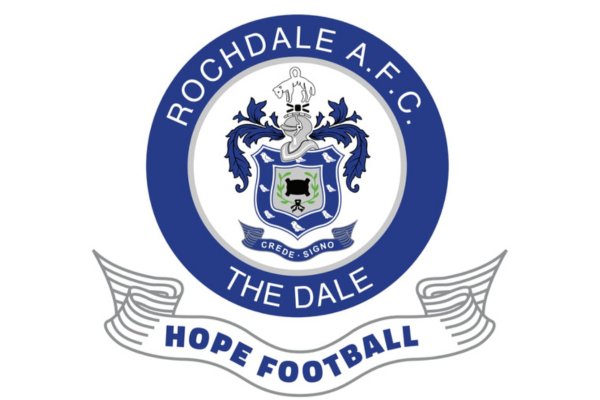
Importantly the programme also challenges public perceptions about people seeking sanctuary. “It’s about understanding and widening the perceptions of people within different organisations and within different demographics,” adds Liz. “To understand that the refugees and people seeking sanctuary are real people. They have so many skills and qualities.
“We’re really lucky that we have links with housing, public health, sexual health, other community groups and organisations and people can be referred into it,” she says passionately, highlighting the far-reaching impact of this work.
Looking forward, there is a clear ambition to develop the work Rochdale AFC and Manchester City of Sanctuary have already done. “We want more people to involve sanctuary seekers,” says Sarah. “And we want to develop a toolkit about what that looks like.”
INVALUABLE
A unique aspect of the Hope Football programme is its reliance on volunteers, many of whom have lived experience as asylum seekers or refugees. This approach brings invaluable benefits to the initiative and the community it serves.
Volunteers with lived experience offer a profound understanding of the challenges faced by new participants. Their empathy and first-hand knowledge create a supportive environment where newcomers feel understood and valued. This connection fosters trust and encourages more people to engage with the programme.
Moreover, these volunteers serve as role models, demonstrating that it is possible to overcome the hardships of seeking asylum and build a new life in the UK. Their success stories inspire hope and motivate others to pursue their goals, whether in football, volunteering or other areas of life.
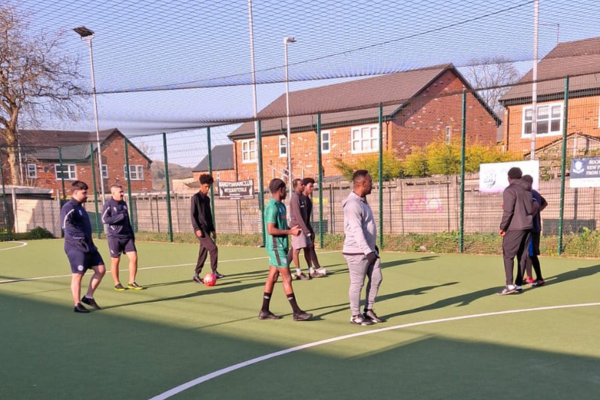
The involvement of volunteers with lived experience also enhances community cohesion. By working together, people from diverse backgrounds learn to appreciate each other's cultures and experiences. This mutual respect and understanding strengthen the bonds within the community, promoting social harmony and reducing prejudice.
The Hope Football programme is more than just a sports initiative; it is a catalyst for community cohesion and support. By bringing people together through football, the programme creates a sense of belonging and unity among participants.
Football, with its universal appeal, serves as a common ground where individuals can connect regardless of their backgrounds. This shared passion for the sport helps break down barriers and fosters friendships that extend beyond the football pitch.
NETWORK
The programme also provides a support network for participants. Many people seeking asylum and refugees face isolation and loneliness, but through Hope Football, they find a community that offers emotional and practical support. This network is crucial for their well-being and integration into society.
Furthermore, the programme collaborates with various local organisations to provide comprehensive support to participants. These partnerships ensure that individuals have access to essential services such as housing, healthcare and education. By addressing these needs, the programme helps participants build stable and fulfilling lives in their new community.
The success of the Hope Football programme highlights the potential of sports initiatives to make a positive impact on the lives of asylum seekers and refugees. As the programme continues to grow, there is a clear ambition to expand its reach and develop new resources to support sanctuary seekers.
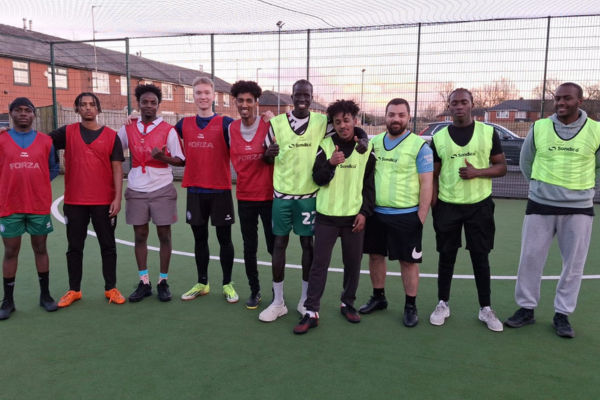
In a world where sanctuary seekers are often marginalised, the Hope Football programme stands as a beacon of hope and dignity. It all starts with a football, a pitch and a warm welcome.
Manchester City of Sanctuary is carrying out a feasibility study to explore how sanctuary seekers can be better supported to volunteer in sports, physical activity and movement. This research, funded by the Volunteering Community of Practice for Volunteering in Sport, Physical Activity and Movement, aims to build understanding and share effective practice on creating inclusive and welcoming volunteering opportunities. If you represent an organisation that already involves sanctuary seekers in volunteering, has tried to, or is open to exploring how you might create more inclusive volunteering opportunities in the future, please reach out to sarah.mccarthy@manchester.cityofsanctuary.org

